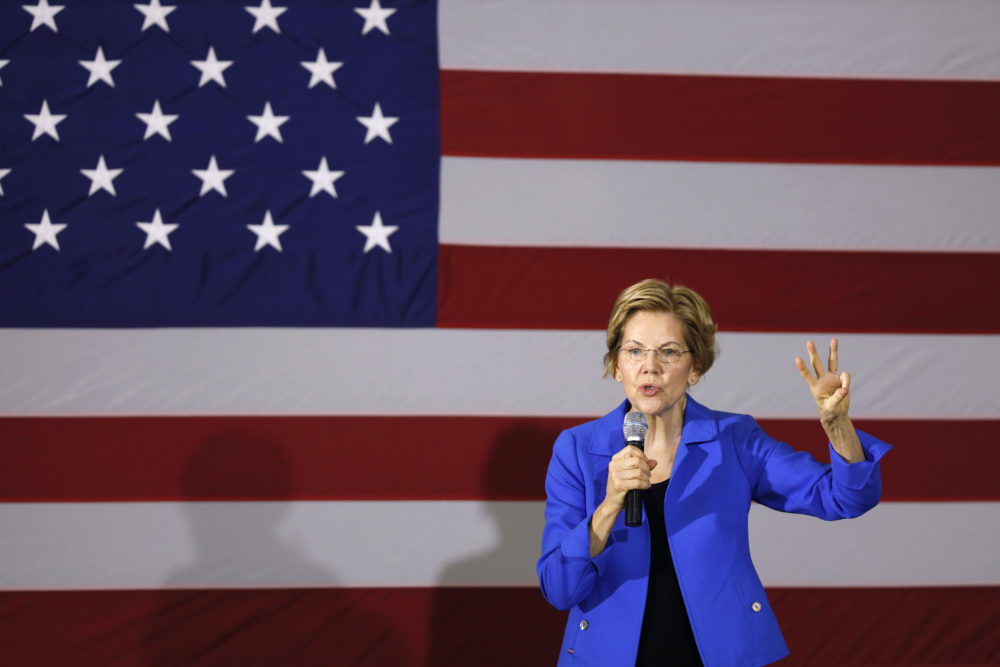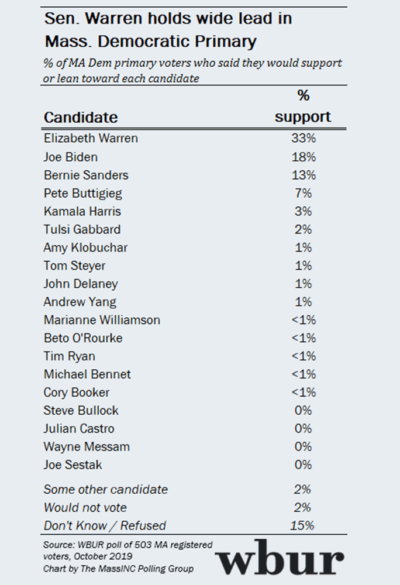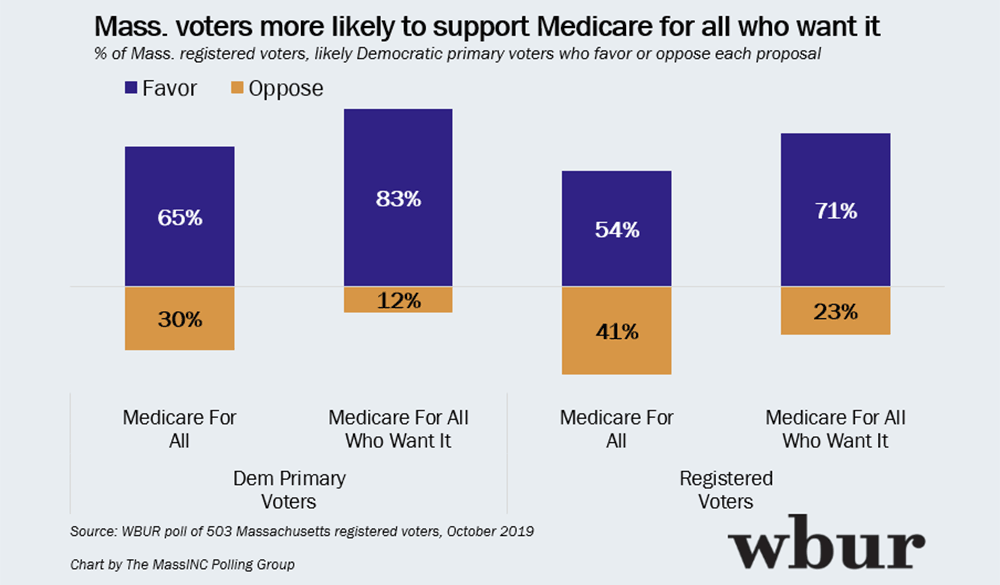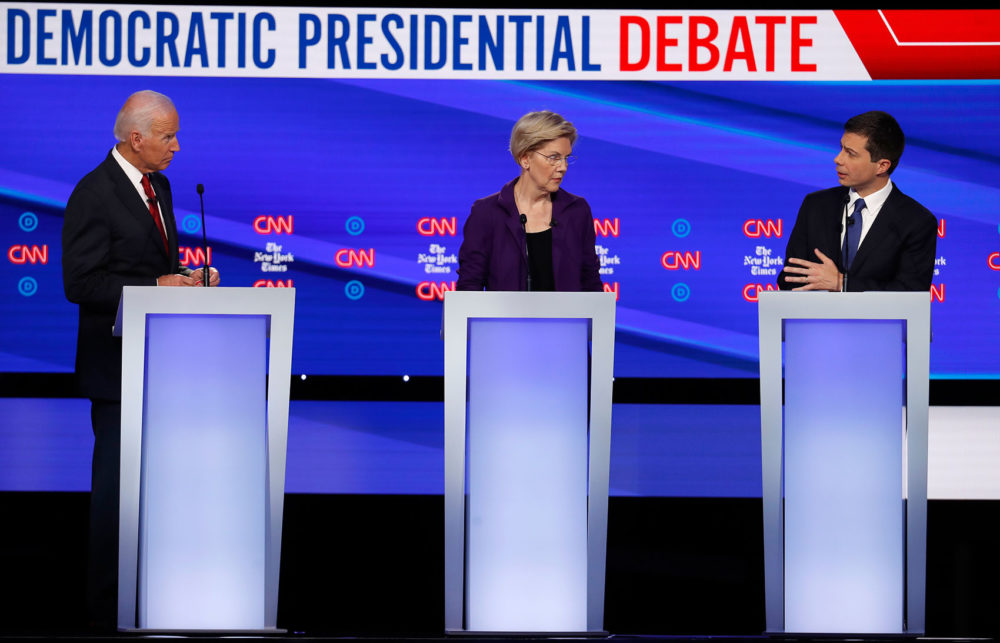Advertisement
Warren Is Mass. Democrats' Top Choice. Her Health Plan Isn't
Resume
In the race for her party's presidential nomination, home state U.S. Sen. Elizabeth Warren has opened up a wide lead among likely Democratic primary voters in Massachusetts, according to a new WBUR poll (topline results, crosstabs).
The result reflects national surveys that show Warren steadily building support since the spring.

But the WBUR poll also has a note of caution for Warren. Medicare for All, which she supports, and which would end private insurance and replace it with a single, government-run system, is less popular among likely Democratic voters in this blue state than a plan that would include a public option, also known as "Medicare for All who Want It."
Warren At 33% In Massachusetts
According to the survey, Warren leads a crowded Democratic field, with 33% of likely voters in the primary supporting her. Former Vice President Joe Biden is second with 18%, Vermont U.S. Sen. Bernie Sanders is at 13%, and Pete Buttigieg, the mayor of South Bend, Indiana, is in fourth place with 7%. Fifteen percent refused to answer or said they didn't know their answer.
While Warren probably benefits from home-field advantage, the poll is the latest in a series of recent surveys that show her moving to front-runner status.
"Elizabeth Warren, across the country, has been climbing steadily, and we see the results of that in this poll," said Steve Koczela, president of the MassINC Polling Group, which conducts surveys for WBUR. "Yes, [Massachusetts] is her home state, but she's also climbed from where she was in September."
A Boston Globe/Suffolk University poll in September found Warren and Biden essentially tied.
Mass. Democrats Prefer The Public Option
But lots of Democratic-leaning voters are not convinced that the Medicare for All plan she and Sanders support is the best way to go.
The survey found that the public option proposal, which would allow people to retain their private health insurance or buy into a government-sponsored plan, is the most popular choice. Asked to choose among four options for the best approach to health care in America, 44% of likely Democratic primary voters picked "Medicare for All who Want It," compared with 28% who chose Medicare for All.
"Medicare for All who Want It" is also the most popular choice among all Massachusetts voters (topline results, crosstabs).

Seth Michaud, a 34-year-old unenrolled voter who lives in Worcester, would prefer that the United States add a public health insurance option.
Said the poll respondent: "There’s freedom of choice in the U.S., right? So why couldn’t we have that same right in regards to health care?"
He also says "Medicare for All who Want It" would be the most acceptable change for Americans, and that government-run health care is a hard sell for some.
"There are people that look down on that," he said.
Tere Ramos, an attorney and mom from Wellesley and a Democrat, prefers Medicare for All but supports offering it just to those who want it as a sort of backup option.
She also says it’s more politically acceptable. "There is an impression in the United States — which is probably false — that if you go for the Medicare for All system, people will lose choices, lines will be longer, the health care is going to go down," she said.
Ramos says that wasn’t her experience while living in Europe, but she worries about trying to change those impressions.
"Because that’s just going to stall our conversation if we continue to just try to force everybody into one silo or one system," she said.
How The Health Care Debate Is Shaping The Race

Moderate presidential candidates like Biden, Buttigieg and Minnesota U.S. Sen. Amy Klobuchar support versions of the public option approach.
The disagreement over the two health care approaches has become a major flash point in the Democratic primary. During a debate last week, Buttigieg used the issue to attack Warren.
"Your signature, senator, is to have a plan for everything, except this," he said. "No plan has been laid out to explain how a multitrillion-dollar hole in this Medicare for All plan that Sen. Warren is putting forward is supposed to get filled in."
Warren has repeatedly avoided answering questions about whether Medicare for All would mean higher taxes on the middle class. But in Iowa on Sunday, she said she'd release details on how she'd pay for Medicare for All in "the next few weeks."
"This much I promise to you," Warren told a crowd in Des Moines. "I will not sign a bill into law that does not reduce the cost of health care for middle-class families. That's what matters to them and that's what matters to them."
This debate will be playing out in the crucial early primary state of New Hampshire this week, with both Warren and Buttigieg campaigning there Thursday.
Battling High Medical Costs
Most respondents in the WBUR poll say that the overall U.S. health system is working poorly, but nearly 90% of registered voters say they are either "very" or "somewhat" satisfied with their current health insurance.
"This often happens in polling: The thing that's closest to you seems to be doing better than the broader system," pollster Koczela said. "Perhaps the most well-known example is that everybody hates Congress, but people keep re-electing their own member of Congress. That showed up here as well."
But if you drill down into the numbers, the survey offers some evidence of real concern by voters about their health care.
Nearly a quarter of those polled say that in the last year, the cost of health care caused them to skip or delay a medical treatment.
Christy Charlot, 23, from Boston, says she has skipped care when she couldn’t afford it — as have many friends.
Among all voters who favor Medicare for All, 87% signaled support for "Medicare for All who Want It." Charlot, a Democrat, is one. "If we’re able to put in a health insurance system that can help many people, if not everyone in America ... it would just make me so happy just to see something like that set in place," she said.
Leominster's Michael Denehy, 72, says letting people buy into Medicare might help more Americans get coverage. But the Democrat says the country can’t afford to buy coverage for everyone.
"I mean, you’re going to have to raise taxes to give Medicare to everybody," he said. "It’ll just bankrupt us."
Taxes would rise to fund Medicare for All but Americans and employers would no longer have to buy health insurance.
Mohammed Djamshidi is an unenrolled voter from Worcester. The 60-year-old would prefer to keep our current health care system, with a choice of health plans, except that he can’t afford the premiums.
Maybe, he says, opening up Medicare to everyone would lower health care costs.
"Especially if you have the young people registered into the Medicare," he said. "You know, they’re healthier, so it offsets the costs for the elderly."
The high cost of health care comes up again and again when talking to voters.
When asked if they’d be willing to wait longer for care, limit where they get treatment, limit their treatment options, or cap prices, a majority of poll respondents said to lower health costs, they'd most be willing to let the government set or cap prices.
Have a story idea, question or feedback? Email the politics team: politics@wbur.org.
This segment aired on October 23, 2019.

